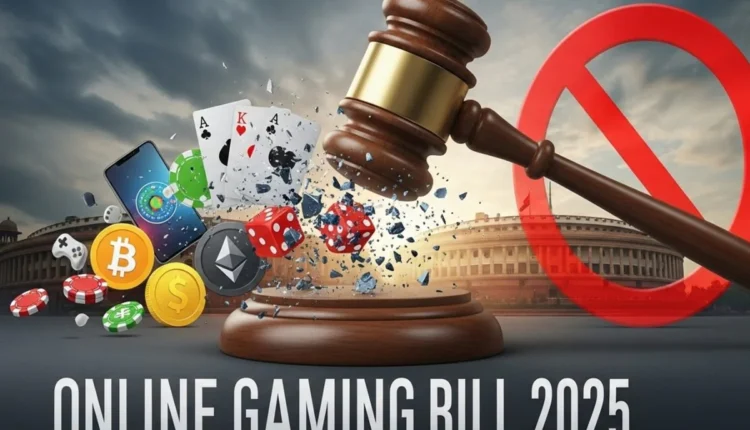Drawing the Line Between Play and Predation: Why India’s Online Gaming Bill Matters?
Aurmella Roohie Bodha
It begins in Bandipora, north Kashmir, where a father’s voice breaks on camera as he describes losing more than ₹1.5 crore on online betting apps, selling his house and vehicles, and dragging his family into a ₹44 lakh debt. “It began with ₹100, then ₹500. Slowly, it grew… I sold everything,” he says. His daughter withdrew from NEET coaching in Srinagar because even ₹8,500 a month became impossible. “These online games are not entertainment—they are drugs. Once you are hooked, you don’t come back.” A Srinagar-based psychiatrist explains the mechanism with clinical precision: the reward system gets hijacked; players keep chasing the next win. Cyber experts add that many such platforms operate from overseas, route money through crypto wallets and foreign processors, and seduce the young with flashy ads and fake testimonials. That single Kashmiri story is not an outlier—it is the human face of a national problem- from Bandipora to Bengaluru and from Kerala to Kashmir, the menace is growing.
It is against this backdrop that Parliament passed the Promotion and Regulation of Online Gaming Bill, 2025 on August 21. The law is India’s first comprehensive attempt to separate constructive digital play from predatory money games, and to do so with both compassion for families and clarity for the industry. It acknowledges the World Health Organization’s classification of “gaming disorder” in the International Classification of Diseases and treats the problem as public health, consumer protection, financial integrity, and national security—together. The Government has told the country plainly that the harms are not fringe: according to figures cited in Parliament, as many as 45 crore people have been negatively affected by online money games, with an estimated loss exceeding ₹20,000 crore. The Bandipora case shows how easily those numbers translate into ruin—often little by little, and then all at once.
The Scale of the Problem
- · 45 crore Indians affected by online money games
- · Estimated losses: over ₹20,000 crore
- · 1,524 betting & gambling websites/apps blocked (2022–June 2025)
- · Case in Kashmir: a family lost over ₹1.5 crore, fell into ₹44 lakh debt
The Bill’s starting point is distinction, not a blanket dragnet. It draws a bright line between three parts of the Indian gaming landscape. First, e-sports—organised competitive play that rewards strategy, discipline, teamwork and skill—are recognised as legitimate sport. The law mandates that the Ministry of Youth Affairs and Sports prepare standards for tournaments, support training academies and research centres, and knit e-sports into India’s wider sports policy through incentives and awareness programmes so that the sector can attract investment, generate jobs and build Indian champions.
Second, the Bill encourages safe social and educational games—casual, age-appropriate titles that support learning, culture or recreation without monetary stakes. The Central Government is empowered to recognise and register such games and to build dedicated, trusted platforms to distribute them, alongside public awareness on healthy play.
Third, and critically, the Bill defines and prohibits online money games—any games of chance, games of skill, or hybrids where financial stakes are involved. This prohibition is not partial: advertising and promotion of such money games are barred; banks and payment systems are forbidden from processing related transactions; and unlawful platforms may be blocked under the Information Technology Act, 2000.
Where previous policy often stumbled on jurisdiction and fragmentation, the new law is explicit on scope and enforcement. It applies throughout India and also to services offered within India but operated from abroad, answering the offshore evasion tactic head-on. It establishes a national-level Online Gaming Authority (or allows one to be designated) with powers to categorise and register games, determine whether a game is a prohibited money game, issue codes of practice, and redress public grievances. This central authority fills the gaps left by the patchwork of state prohibitions and civil rules, giving developers and investors clarity while giving families a single point of accountability.
What the Bill Does
- Recognises e-sports as legitimate sport
- Encourages safe social & educational games
- Prohibits money games with financial stakes
- Establishes Online Gaming Authority for oversight
- Bars advertising & promotion of betting apps
- Mandates KYC, age verification & payment blocking
The law’s penalties are calibrated to change behaviour, not merely signal intent. Offering or facilitating online money games can attract up to three years’ imprisonment and fines up to ₹1 crore, with harsher consequences—up to five years and ₹2 crore—for repeat offenders. Advertising or promoting such games carries up to two years’ imprisonment and a fine up to ₹50 lakh.
For the first time, corporate and institutional accountability is codified so that companies and their officers cannot hide behind offshore shells; at the same time, independent and non-executive directors have a safe harbour where they can show due diligence, striking a balance between deterrence and fairness. These are not symbolic clauses: they tell the market that predation will be punished and responsible governance respected.
Crucially, the Bill does not operate in isolation but locks into India’s wider legal architecture to close the old loopholes. Under the Information Technology Act, 2000, Section 69A already empowers the Government to block unlawful content and links; between 2022 and June 2025, 1,524 betting and gambling websites and apps were blocked, signalling capability and intent. The IT (Intermediary Guidelines and Digital Media Ethics Code) Rules, 2021—as amended in April 2023—put obligations on intermediaries not to host illegal content and created a registration regime via self-regulatory bodies for permissible online games; the new law builds on that base and removes the “grey zone” around money games.
The Bharatiya Nyaya Sanhita, 2023 reinforces consequences for unlawful economic activities and unauthorised betting and gambling (with punishments extending up to seven years), while investigations under the Bharatiya Nagarik Suraksha Sanhita, 2023 allow authorised officers to search and seize digital and physical property linked to offences—and, in specific circumstances, to enter premises and make arrests without warrant.
Penalties Under the Bill
- Up to 3 years in jail + ₹1 crore fine for offenders
- 5 years & ₹2 crore for repeat offenders
- 2 years in jail + ₹50 lakh fine for advertising/promoting money games
- Corporate liability: companies & officers accountable
On the fiscal side, the Integrated Goods and Services Tax Act, 2017 has been brought to bear: offshore suppliers of online money gaming are to register under a Simplified Registration Scheme, and the Directorate General of GST Intelligence can direct intermediaries to block access to unregistered or non-compliant platforms so that digital businesses follow the same tax rules as physical enterprises.
Consumer protection and public messaging complete the circle. The Consumer Protection Act, 2019 prohibits misleading and surrogate advertising; the Central Consumer Protection Authority can investigate, penalise, and even pursue criminal action against offenders, and has issued advisories cautioning celebrities and influencers against endorsing betting platforms. The Ministry of Information and Broadcasting has, through a series of advisories in 2022, 2023 and 2024, warned broadcasters, publishers and digital platforms against carrying surrogate or direct ads for betting and money games.
The Ministry of Education has circulated guidance for parents and teachers on safe gaming habits and digital hygiene for children. And for citizens who are already victims, the National Cyber Crime Reporting Portal (cybercrime.gov.in) and the 1930 helpline provide a route to report financial frauds quickly, with cases routed to state/UT law enforcement.
Read together, these measures make clear why the Bandipora case is not just a tragedy—it is a policy test. The victim’s own account tracks the classic addiction arc: small wagers that escalate, credit that substitutes for income, the sale of assets to chase losses, and finally, a family pushed into isolation and shame.
The Bill answers that arc point by point: it removes the most dangerous product (prohibiting money games and their advertising), cuts off the fuel (blocking payment rails and crypto-routed processing tied to prohibited games), creates a referee (the Online Gaming Authority) to distinguish safe from unsafe games, and builds the social scaffolding—awareness campaigns, school-level guidance, and consumer enforcement—so that parents and young users can recognise the trap before they fall in.
Why This Bill Matters
- · Protects middle-class families from debt traps
- · Shields youth from gaming addiction
- · Closes loopholes used by offshore operators
- · Harmonises fragmented state laws under one framework
- · Boosts India’s e-sports & digital gaming industry



Comments are closed.